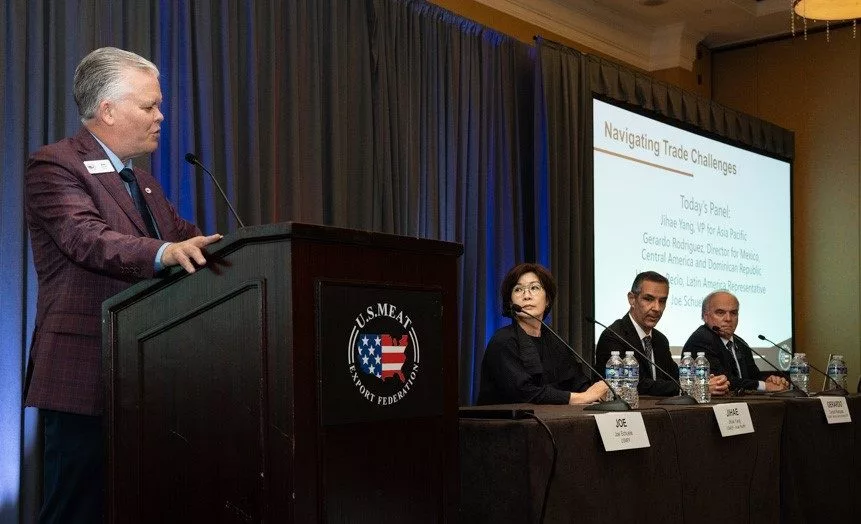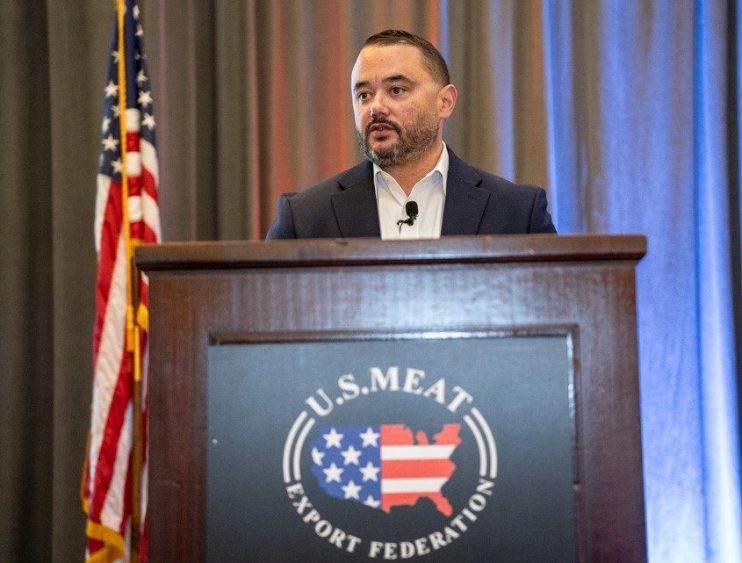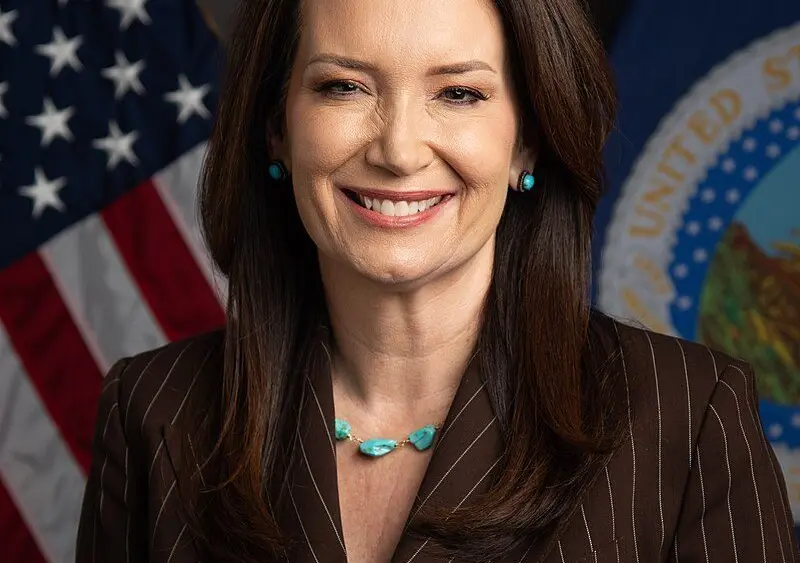
The U.S. Meat Export Federation (USMEF) concluded its Spring Conference in Fort Worth, Texas, Friday with a panel discussion in which senior international staff gave examples of innovative efforts to overcome trade challenges.
Jihae Yang, USMEF vice president for the Asia Pacific, noted that with high tariffs and other barriers severely limiting pork and beef exports to China, the organization has intensified campaigns aimed at moving items traditionally popular in China to alternative markets. For example USMEF partnered with a major retailer in South Korea for a promotion of U.S. beef short plate, after uncertainty over plant eligibility and higher tariffs made the product more difficult to move in China. Yang added that if the trade impasse with China persists, she foresees more U.S. short plate being available to importers and distributors in Southeast Asia.
Yang also updated members on how USMEF is working with a Korean meal kit manufacturer and a Japanese distributor to develop and promote items featuring U.S. pork bung. U.S. pork tongue trimmings are also being promoted in popular dishes in Japan’s casual dining sector.
Gerardo Rodriguez, USMEF director for Mexico, Central America and the Dominican Republic, explained that while Mexico has been developed into the largest destination for U.S. red meat, the U.S. industry now faces unprecedented levels of competition in the Mexican market. He noted that it is more important than ever to differentiate U.S. red meat from other suppliers’ products and educate consumers about its unique attributes.
“Right now a major focus for USMEF is to establish loyalty in the next generation of consumers, developing several programs for the future customer,” Rodriguez said. “With Mexico being a trading partner for so long, it can be easy to think of it as a mature market. But there are always new markets within the market that we can expand, and new tactics we can employ. Our mobile grill academy is a good example, where we highlight the unique attributes of U.S. red meat all across the country.”
USMEF Latin America Representative Homero Recio highlighted the U.S. industry’s efforts to overcome Colombia’s restrictions on U.S. beef, which were imposed for much of last year due to findings of highly pathogenic avian influenza in dairy cows. The ban, which eventually extended to beef from 14 U.S. states, was lifted in September 2024 but the impact has persisted, in part because it created a new opportunity in the Colombian market for Canadian beef. Recio said that while reclaiming this business has not been easy, it has resulted in heightened efforts to establish customer loyalty to U.S. red meat.
“This really gave us the resolve to say, ‘we’re going to get this back, we’re going to fight back,’” he explained. “In the past, we often talked about ‘our importers.’ Well, you know what? ‘Our importers’ went and bought Canadian beef. So we have to go to the next level, whether it’s with a supermarket chain or a foodservice chain, and develop a further, stronger relationship with them and really tie them to a brand.”
John Newton, executive head of Terrain, was the featured speaker at USMEF’s Thursday general session. Newton applauded the House of Representatives’ passage of President Trump’s budget reconciliation bill earlier that morning.
“If anybody stayed up until 3:00 or 4:00 in the morning last night, you know that President Trump’s ‘big, beautiful bill’ made it over the finish line in the House. There is work to do in the Senate, but the bill touches on a lot of the Farm Bill elements that farmers have been asking for.”

Newton explained the urgency of many farm programs included in the bill as he described some of the major challenges facing agriculture, especially row crop producers. Farm operating costs remain elevated while revenue derived for major crops have been below cost of production for three straight years, he said. Input costs show no signs of going down, while crop prices have – in some cases – fallen by 30% and show no signs of improvement.
“For seven years now, Congress has responded to ag market conditions with annual ad hoc support for agriculture. But it’s that federal support that’s been propping up the farm economy. It’s not because we’re seeing higher grain prices.”
Newton described the process the bill will undergo in the Senate and while expecting some modifications, believes the goal in the Senate is to get it signed by July 4.
Newton highlighted an increase in funding for USDA’s export market development programs as critical support for America’s farmers and ranchers. Strengthening these programs will be very helpful in finding and developing new markets around the world. Newton added that the USDA Foreign Agricultural Service is particularly bullish on expanding American agriculture’s footprint in Southeast Asia.
“The world becomes more competitive each year, so, it’s really important for us to get out and find those new deals to help the farm economy,” Newton explained. “Trade is clearly a focus of this administration, and I think President Trump will push for substantive progress ahead of next year’s midterm elections. In fact, I might be one of the few people who thinks we’re going to get a Phase Two deal with China.”
Heightened U.S.-China trade tensions, which have severely limited beef and pork exports to China in recent weeks, were a major topic of discussion throughout the USMEF Spring Conference. But President and CEO Dan Halstrom noted that rather than dwell on trade obstacles, the conversation focused mostly on how to develop and capitalize on alternative destinations.
“USMEF’s focus is on bringing solutions to the table,” Halstrom said. “So when we see something like China happen, we’re pivoting on the demand side – and this is what our membership expects of us. That’s why we have these offices all over the world, 105 employees in 20 regions, and that’s what they are there for – to be as nimble as possible at finding solutions when there are changes in market conditions and market access.”
Opening day speakers at the USMEF Spring Conference included CattleFax CEO Randy Blach and Rick Stott, President and CEO of Superior Farms. Highlights from their remarks are available in this press release.
USMEF members will next meet at the organization’s annual Strategic Planning Conference, Nov. 12-14 in Indianapolis.



